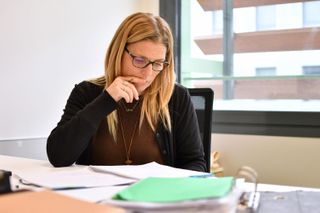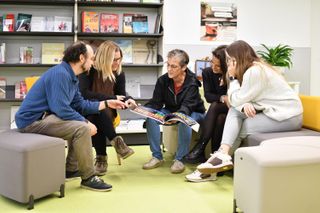
Laura Torreguitart Llauradó (Barcelona, 1979) is a teacher in Early Childhood Education (UAB). Raised in Sabadell, settled in Sant Joan de Vilatorrada and with a strong bond with Castellfollit de Riubregós, her vocation as a teacher was clear because she has always been curious about learning and because the teachers she had during her school days made a very positive impression on her. Currently, she coordinates the advanced vocational training cycle in Early Childhood Education at the UManresa Professional Campus. It was through a colleague from the Campus that she discovered the potential of simulation for teaching work. That is why she decided to train as a simulation instructor through a course at the Centre for Innovation in Simulation (CISARC). She wanted to continue studying in this field so enrolled on the university master’s degree in Simulation Methodology, taught by UManresa. She now applies the methodology in classrooms and is so convinced of its usefulness that she is preparing a doctoral thesis to apply it to the work of teaching teams in education centres.
Where does your vocation to be a teacher come from?
This is a question I often ask my students. In my case, I think it comes from curiosity. I have always liked to learn, to share what I learn with other people, especially with children, who have not yet been "contaminated". But I also believe that a large part of my vocation comes from the influence of the teachers at the schools in Sabadell where I studied: La Gespa and l'Escoleta de Bellaterra. I had some exceptional teachers there, who applied innovative methodologies, who made us think, who stimulated our critical sense. I wanted to be like my teachers. In fact, I was lucky enough to be able to collaborate there as a monitor while I was a student. I think, however, that vocation must be cultivated, by sharing knowledge, learning different ways of doing things. And my vocation continues to grow today.

"I've always really liked learning, sharing what I learn with other people (...) But I also believe that a large part of my vocation comes from the influence of the teachers at the schools in Sabadell where I studied (...) vocation must be cultivated, by sharing knowledge, learning different ways of doing things. And my vocation continues to grow today"
What has been your career path?
My first job, after graduating, was at a school in Vallès Occidental. I don’t have a very good memory of it, because the way children were accompanied there went against what I thought it should be. When my partner and I decided to settle in the Bages area, I joined a subsidised private school in Manresa as a substitute teacher. I did not really like it either, but it was a centre that was more respectful of the children than what I had experienced in my first job as a teacher. I was lucky that just then the Manresa municipal nursery schools project was launched and I joined the team at l'Estel kindergarten, where I learned and at the same time unlearned to be a teacher. I was there for seven years. When I went back after my first maternity leave, my perspective changed and I began to see things that I did not like in the treatment of the children. That is why, when I was given the opportunity to take on a new teaching project, the start-up of the Rexics School in Fonollosa, I accepted immediately. I ran the centre for 10 years and learned a lot there.
And how did you end up at the University?
Well, it was while I was in Rexics. Early Childhood Education studies gave me the opportunity to give talks to master’s degree in Early Childhood Education students about what it was like to carry out a project to create a nursery school from scratch. And from there, everything else started to emerge. First, they proposed that I teach a first-year subject and then take on the fourth-year practicum. I did this by combining it with work at the nursery school until I became a mother for the second time. Just then, the University was starting to consider the creation of a new advanced vocational training cycle (CFGS) in Early Childhood Education and I was asked to design it. When I was asked to coordinate it, I had to decide whether to leave the nursery school or continue there and pass up the professional opportunity to get involved in the launch of new studies. I was very excited to take on this new challenge, but it was a very difficult decision to make, because the nursery school was at a very good stage. I was not wrong about this, because Rexics and the nursery school project has continued to grow with the current team. In fact, the school still has ties with the University that have helped it to grow and become an example of good practices in the early stages of education.
How does your vocation help you in teacher training?
I really like to explain things and see people’s curiosity. When I gave the first talks, I came into contact with young people and connected with them based on my experience as a teacher training student. When you are a mother, your perspective of nursery school changes. The same thing happens with teaching, because I have also been a student and I would like all the people I have in class to come every day with enthusiasm, which is what happened to me. Vocation encourages me to leave behind the traditional teaching that has always been done in the same way, because it does not work. The University has given me a lot of freedom to approach training and the challenge I always set myself is to use new methodologies, new ways that allow me to achieve the goal of motivating students.

"The University has given me a lot of freedom to approach training and the challenge I always set myself is to use new methodologies, new methods that allow me to achieve the goal of motivating students"
Is this how you came into contact with simulation?
I did not know anything about simulation until I met the coordinator of the advanced vocational training cycle in Dental Prosthetics. She was doing her university master’s degree in Simulation Methodology at UManresa and often talked to me about how useful it was in teaching. I started doing the Simulation Instructor Course and fell in love with this methodology. It was very clinical, but I saw that it had a lot of potential to be used as a teaching tool in the educational field. And I set out to become an expert in simulation and thus to be able to apply the methodology to the advanced vocational training cycle in Early Childhood Education and to the bachelor’s degree in Early Childhood Education. That was why I enrolled on the university master’s degree.
Doing the master's degree made a big impression on me, not only because of the learning, but also because of the quality of the teachers. In addition, when you have been teaching for many years, it is good to put yourself back in the role of a student, it is very enriching. You realize the great effort that the teachers make to prepare training aimed at experience. Everything we did on the master’s degree moved me and connected me personally and professionally. It was a training course that made me grow a lot, that gave me constant tools to look at the student in a different way. Everything I learned could be applied immediately, with students and the team’s teaching staff. I am convinced that I am now a better teacher, more capable and I feel strengthened, because the master's degree forced me to confront things that I thought I was doing well, but it also reinforced some things that I was already doing right and that became more meaningful.
What possibilities does simulation have in the educational field?
It has very high potential because it allows you to put the student in very real situations, and this means that they train in skills specific to the profession and skills that are transversal, which will be useful for their whole life. Unlike other disciplines, simulation applied to education is not so technical, but it is a great tool for training in situations that are similar to those they will experience and it makes them grow professionally. Students who have done a simulation have the feeling that this is one of the methodological tools that makes more sense of what they are studying.

"Simulation applied to education is a great tool for training in real situations and makes you grow professionally. Students who have done a simulation have the feeling that this is one of the methodological tools that makes more sense of what they are studying"
And how do you use it in the advanced vocational training cycle and the degree?
Right now, we are designing a simulation programme for early childhood education studies. Designing this programme is complex, because it must meet certain learning objectives and must be endowed with academic rigour. We are also trying to get teachers to do simulation instructor training so that they become familiar with the methodology and have a network of teachers who specialize in it. This is a project that we are developing with the support of CISARC, the Centre for Innovation in Simulation at UManresa. A simulation always has a lot of work behind it that is not seen.
One of our goals is to extract scientific evidence from the simulation programme applied to education, to demonstrate that its use helps in the training of future education professionals. We are already working on this through the talent map with advanced vocational training students. The aim is to see how the work done during the two courses of the cycle, using the simulation, has an impact on people and on the improvement of each student’s skills.
What does simulation contribute to teacher training?
As well as internships in schools, the simulation adds to the experiences of professionals before they stand in front of a classroom. We can simulate, for example, a job interview to join a teaching team. Work on this during studies provides security when graduates deal with the situation in real life. We also work on simulations of teamwork between teachers or relationships with families.

"I am fully convinced that simulation can help to improve relationships between teaching teams in schools, which is why I will dedicate my doctoral thesis to it. Teamwork is fundamental in any kindergarten, school, university or institution dedicated to education"
Are you so captivated by simulation that you are going to dedicate your doctoral thesis to it?
Yes, I have just enrolled for the UVic-UCC Doctoral College, on the doctoral programme in Teaching Innovation. My thesis will be on the use of simulation to improve the work of teaching teams. With my experience of more than twenty years as a teacher and as an internship tutor, I have realized that one of the main problems in schools is bad relationships between the people who make up the teaching teams. Teams are everything in a school and members must respect, understand, accept and value each other to carry out a good educational project. I am fully convinced that simulation can help to improve this relational aspect and that it can be a great tool to boost its development so that there is real teamwork that is fundamental in any kindergarten, school, university or institution that is devoted to education.